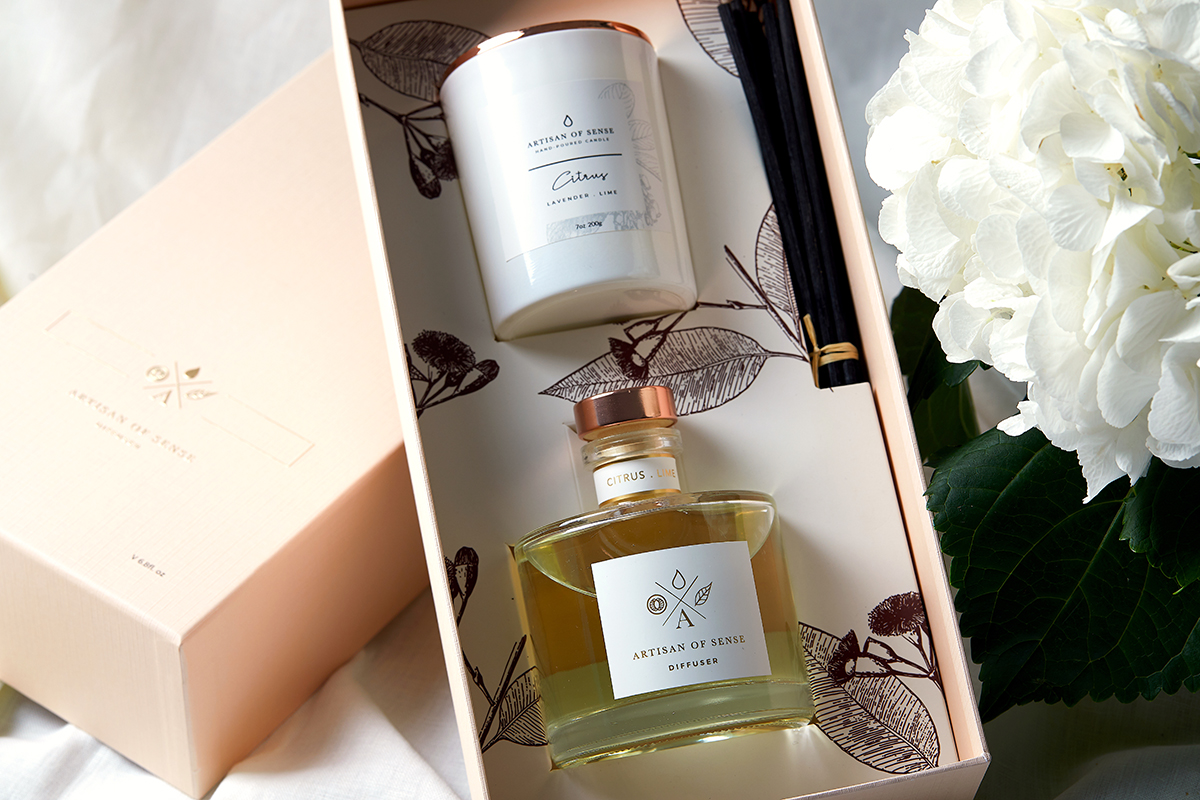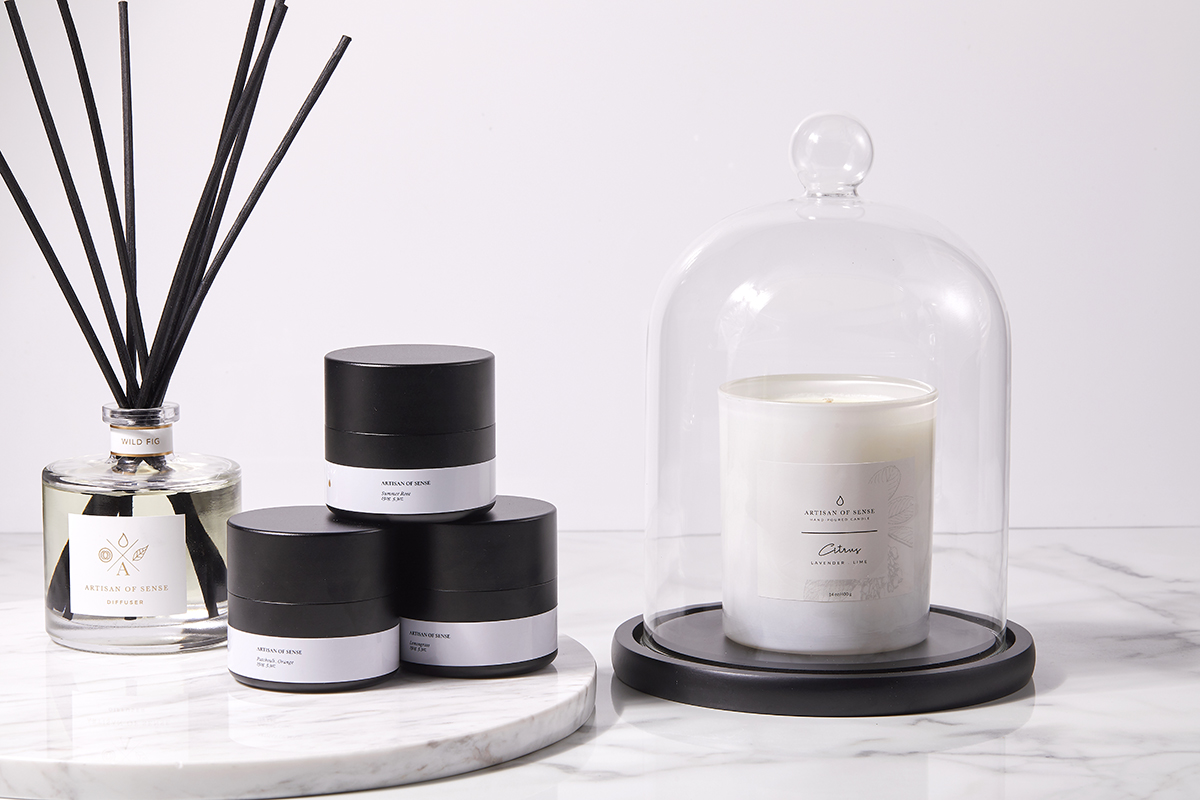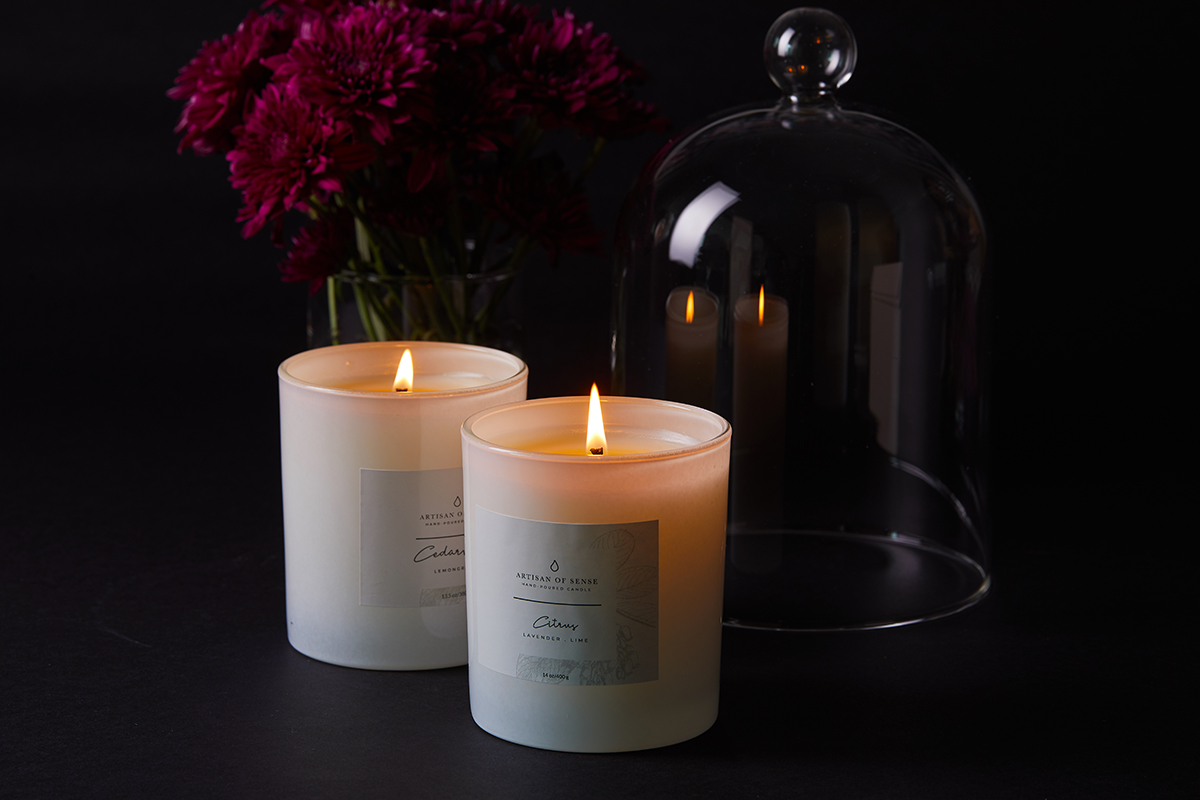Home fragrances can be a bit of a mystery. With the vast variety of candles and diffusers on the market, it can be hard to figure out where to start and how to choose a good quality product. What makes a long-lasting candle? What’s the ideal position for a reed diffuser? How do we choose the perfect scent for every room of the house? We spoke to Vivian Chung, founder of local home fragrance brand Artisan of Sense, to get her expert tips for navigating the world of home fragrance.
SquareRooms: What’s your top tip for people who are new to home fragrance?
Vivian Chung: A home fragrance shouldn’t be the first thing one notices when entering a new space, but rather something that creeps up on you as you settle in. Just like the fragrances you choose to wear, the scents you select for your home are personal. They define the space in which you live by contributing to your overall experience of your home, and by making a lasting impression on your guests.
What are your recommended scents for different rooms of the house?
In the entrance… A carefully chosen natural scent can help to emphasise the character of a home. I’d recommend something like a fresh rose, jasmine or lavender in the entrance hall as it has such a fresh, inviting scent that connects to the outdoors.
In the living room… As we are spending more time at home now, the living room serves as the most dynamic space. The scent you choose for this space serves as a foundation to complement or enhance the activities that take place in the living room. A sensual, earthy and floral fragrance is a universal favourite that will warm up the space and is appropriate for everyday use. Fruity and citrus scents help to create a happy and refreshing atmosphere that will complement time spent with family. If you’re working from home, peppermint and rosemary will be the number one choice to help you stay focused.
In the kitchen… For the kitchen, I always recommend citrus-based candles or room sprays. They cleanse the air of cooking scents but also awaken the palate, building anticipation for your culinary creations.
In the bedroom… Bedroom scents are intimate, so choose your favourite scent to construct your personal refuge. I personally like botanical scents which promote a soothing, relaxing environment. I like to place my lavender, eucalyptus and sage candle directly next to my bed, as eucalyptus and sage are believed to reduce stress levels, while lavender aromas help promote a restful sleep. Even without burning the candle you can inhale the aroma first thing in the morning.

In which situations do you recommend people use candles? When are diffusers more appropriate?
Candles work better in bigger spaces because they generally have stronger scent throw. They are also perfect for setting a cosy mood and giving us an excuse to relax the evening away with a dinner or a bath. If you’re looking for a long-lasting, flameless fragrance, reed diffusers are more efficient—they’re good for continual, overall ambience.
I recommend placing reed diffusers in the areas that you pass through once in a while, like a powder room and hallway. Candles, on the other hand, should be used in the spaces you reside and relax in most often, like the living room and bedroom. This way, the candles and diffusers will work together to keep the home smelling at its absolute best at all times.
What are the pros and cons of reed vs electric diffusers?
Reed diffusers can be used safely 24/7, are easy to handle with little to no clean-up or maintenance and come with a very long-lasting fragrance. However, they only work well in a small or enclosed room like a bathroom or bedroom. Anything larger and the scent will be quite faint, unless you opt for a synthetic fragrance.
Electric diffusers, on the other hand, just require a few drops of essential oil per use and don’t involve any heating, which could change the chemical composition of the oil. On the downside, the essential oils end up getting diluted in the resulting mist. Electric diffusers should also not be used continuously for long periods of time and are not ideal for very humid areas.

Do you have any tips for using candles?
To get the most out of any candle, it needs to burn for a good few hours when lit for the first time in order to establish good “wax memory.” Do not extinguish the candle before the entire wax surface is liquid. This will ensure a clean burn. Additionally, make sure to always trim the candle’s wick before re-lighting and never blow out a candle—use a snuffer or dipper to extinguish it instead. Three basic safety rules for candles:
- Never leave a burning candle unattended
- Never burn a candle on or near anything that might catch fire
- Keep candles out of the reach of children and pets
How about diffusers?
Reed diffusers are very independent. Their continuous, flameless fragrance throw provides the easiest way to make even the dankest corners of your home beautifully scented. Place them on bookshelves, in bathrooms, in storage rooms and around the office to keep these spaces smelling good 24 hours a day. Some tips for taking care of reed sticks:
- Flip the reed sticks every 3-6 days
- Once the reed sticks have been dipped in a certain scent, you cannot reuse them with another fragrance
- If your reed sticks are no longer giving off any scent, they may be clogged with dust and need to be replaced
What’s your advice for keeping home fragrances strong over time?
I like to spray my curtains with an organic room spray to get a gentle waft as the curtains flutter in the breeze. I often spritz my sofa as well so that my friends can have a little plume of scent as they sink into the cushions.

Do you have any tips for people who love home fragrances but live with others that don’t like them?
It’s a tough question. First of all, we need to understand why they don’t like home fragrances. Many people are allergic or sensitive to modern chemicals that are found in commercial fragrances. Symptoms of fragrance allergies include severe headaches, migraines, running nose and watery eyes. Try natural, non-toxic fragrances that are free of phthalates and parabens instead.
Any final tips or advice you’d like to share?
Don’t be too quick to narrow down your favourite scent. Your moods and tastes change and you won’t always be scenting for the same purpose and occasion. Ask yourself the following questions to determine which scent is your favourite for a particular scenario instead:
- Where will you be using this scent?
- What type of mood or feeling are you looking to evoke?
- What type of scents or notes do you lean towards in your personal fragrance?



